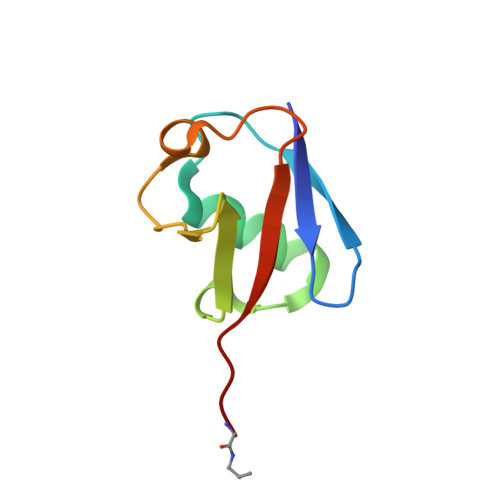Deubiquitinase function of arterivirus papain-like protease 2 suppresses the innate immune response in infected host cells.
van Kasteren, P.B., Bailey-Elkin, B.A., James, T.W., Ninaber, D.K., Beugeling, C., Khajehpour, M., Snijder, E.J., Mark, B.L., Kikkert, M.(2013) Proc Natl Acad Sci U S A 110: E838-E847
- PubMed: 23401522
- DOI: https://doi.org/10.1073/pnas.1218464110
- Primary Citation of Related Structures:
4IUM - PubMed Abstract:
Protein ubiquitination regulates important innate immune responses. The discovery of viruses encoding deubiquitinating enzymes (DUBs) suggests they remove ubiquitin to evade ubiquitin-dependent antiviral responses; however, this has never been conclusively demonstrated in virus-infected cells. Arteriviruses are economically important positive-stranded RNA viruses that encode an ovarian tumor (OTU) domain DUB known as papain-like protease 2 (PLP2). This enzyme is essential for arterivirus replication by cleaving a site within the viral replicase polyproteins and also removes ubiquitin from cellular proteins. To dissect this dual specificity, which relies on a single catalytic site, we determined the crystal structure of equine arteritis virus PLP2 in complex with ubiquitin (1.45 Å). PLP2 binds ubiquitin using a zinc finger that is uniquely integrated into an exceptionally compact OTU-domain fold that represents a new subclass of zinc-dependent OTU DUBs. Notably, the ubiquitin-binding surface is distant from the catalytic site, which allowed us to mutate this surface to significantly reduce DUB activity without affecting polyprotein cleavage. Viruses harboring such mutations exhibited WT replication kinetics, confirming that PLP2-mediated polyprotein cleavage was intact, but the loss of DUB activity strikingly enhanced innate immune signaling. Compared with WT virus infection, IFN-β mRNA levels in equine cells infected with PLP2 mutants were increased by nearly an order of magnitude. Our findings not only establish PLP2 DUB activity as a critical factor in arteriviral innate immune evasion, but the selective inactivation of DUB activity also opens unique possibilities for developing improved live attenuated vaccines against arteriviruses and other viruses encoding similar dual-specificity proteases.
Organizational Affiliation:
Molecular Virology Laboratory, Department of Medical Microbiology, Leiden University Medical Center, 2333 ZA, Leiden, The Netherlands.

















